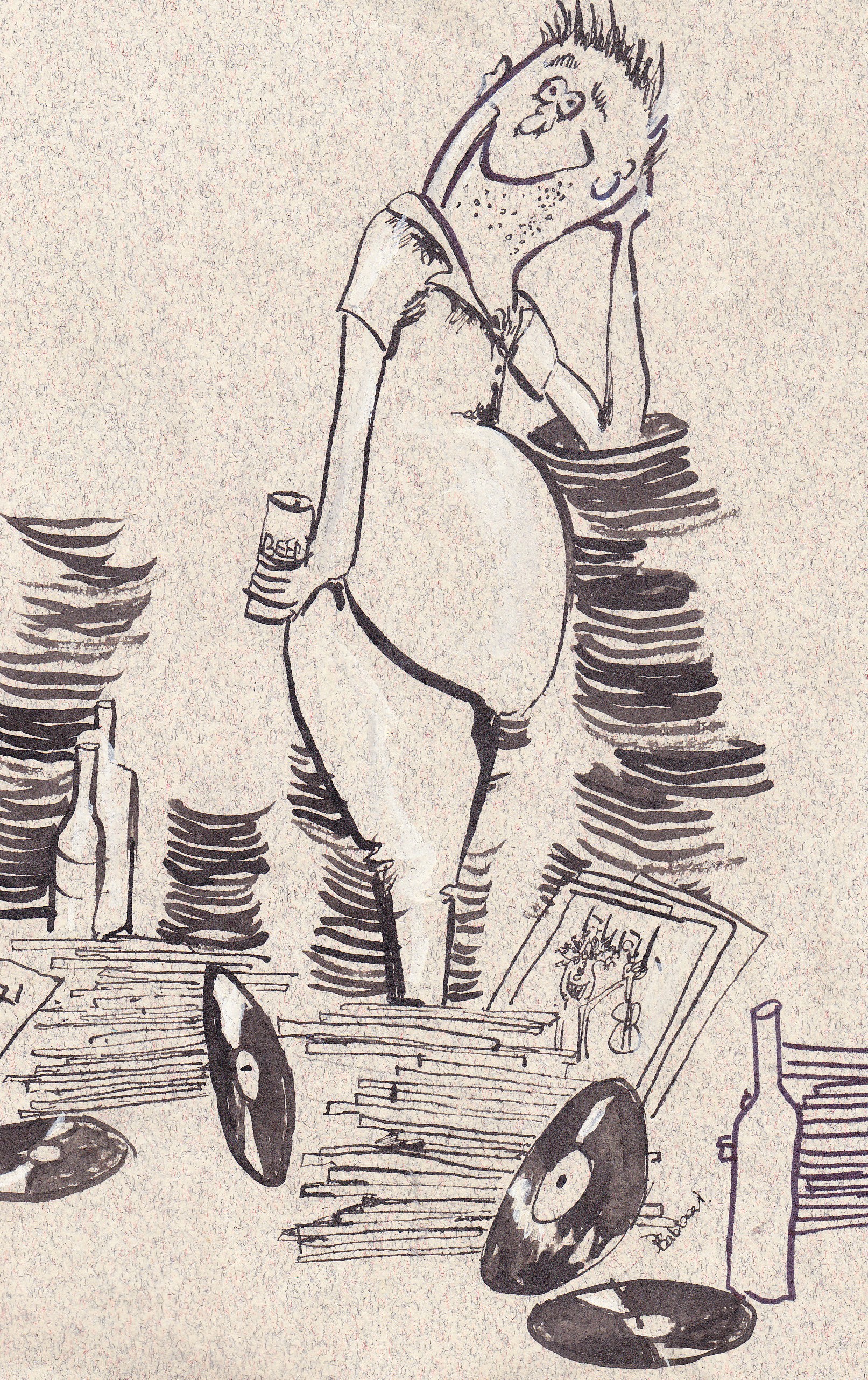- Vinyl-Records>
- The British Blues Invasion, taking the blues back to its homeland!
The British Blues Invasion
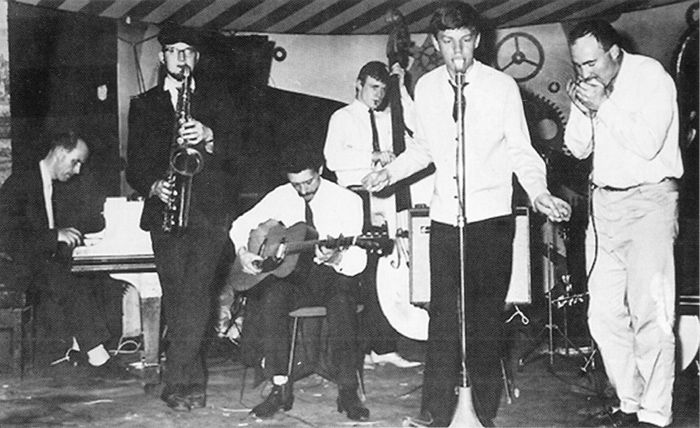 The British Blues Invasion forefathers! Alexis Korner on guitar, Cyril Davis on harmonica, and Mick Jagger on vocals.
The British Blues Invasion forefathers! Alexis Korner on guitar, Cyril Davis on harmonica, and Mick Jagger on vocals.Birth of the British Blues Invasion
The British Blues Invasion started in London in 1964, well after the Liverpool scene got into swing, way back in '61. The audiences in the London Blues scene were middle class folk, mainly university and art school students. The material they came to her was the American blues artists like Howling Wolf, Muddy Waters Jimmy Reed, Willie Dixon and the like.
Cyril Davis, Alexis Korner and Chris Barber were the artists who who were the founders of the British Blues Invasion.They were the ones who first made the Blues popular in London. It was actually Chris Barber, well known skiffle player, who first started playing adaptions of some American Blues songs. Although this was not pure blues , it was the first time London folk heard the blues.
Two members of Barbers band Cyril Davis (below left) and Alexis Korner (right) left the band and formed Blues Incorporated, along with Long John Baldry. These musicians eventually parted, and Davis formed his All Stars. In the photo above, Cyril Davis is on harmonica, with Alexis Korner seated on guitar. The young vocalist is none other than Mick Jagger. All these musicians were in the forefront on the British blues invasion.
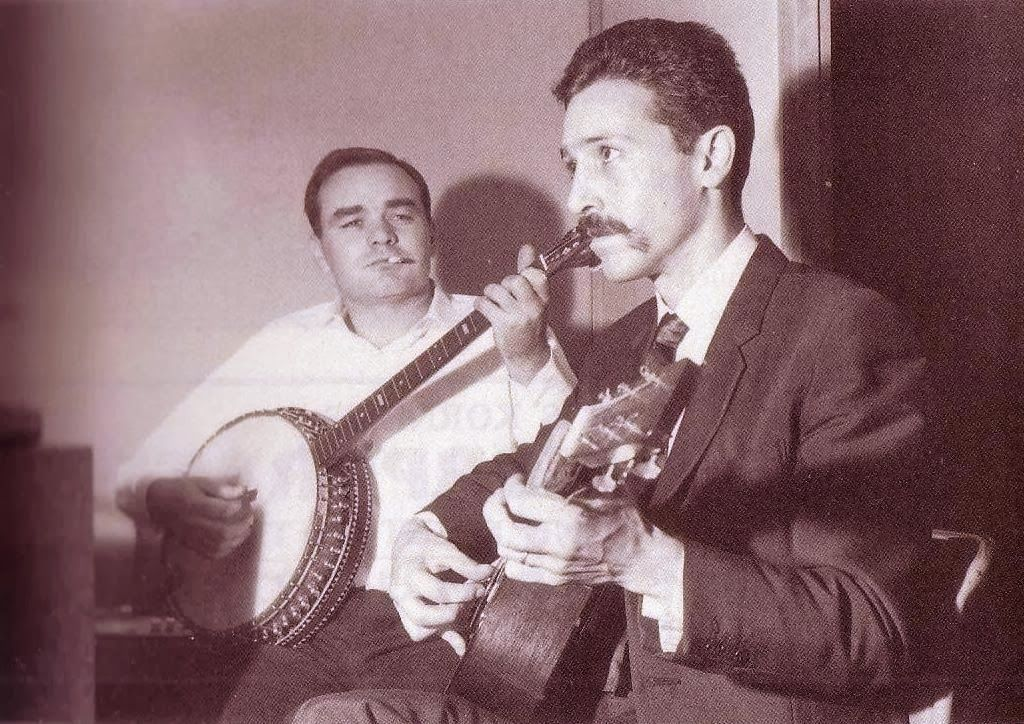 Two members of Barbers band Cyril Davis (above left) and Alexis Korner (right) left the band and formed Blues Incorporated. These two musicians eventually parted, and Davis formed his All Stars.
Two members of Barbers band Cyril Davis (above left) and Alexis Korner (right) left the band and formed Blues Incorporated. These two musicians eventually parted, and Davis formed his All Stars.Two members of Barbers band Cyril Davis (above left) and Alexis Korner (right) left the band and formed Blues Incorporated. These two musicians eventually parted, and Davis formed his All Stars.
So, the three founding bands of the British Blues Invasion scene were these two bands and Georgie Fames Blue Flames. From these bands, the Blues scene flourished, with clubs opening around the city. So, what was to become The British Blues Invasion had begun.
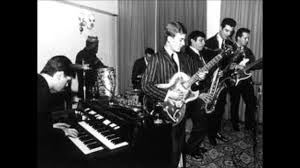 Georgie Fame (left) and the Blue Flames at the Flamingo in Londons East End, 1964
Georgie Fame (left) and the Blue Flames at the Flamingo in Londons East End, 1964The first of these was the Roundhouse, opened by Davis and Korner where they ran the Rhythm and Blues Barrelhouse Club. They also opened the Rhythm and Blues club in 1962. Here is where the likes of the Rolling Stones, as well as Bluesology and the Pretty Things first played in public. The most famous club, The Marquee, featured the Stones, (where they played their first paid gig) The Yardbirds and Sony BoyWilliams. Blues Inc. and the All Stars regularly played there Klooks Kleek, West Hampstead, was where John Mayall made his live album, before the famous Beano L.P.
So, began the growth of British Blues, and the emergence of the bands that took the music back to where it started, back to America.
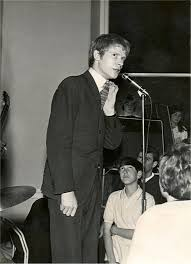 Long John Baldry at the Roundhouse,
in the early 60's
Long John Baldry at the Roundhouse,
in the early 60'sLong John Baldry, an original Blues singer, was gigging way back in the 50’s, and joined the Alexis Korner/Cyril Davis group at the Roundhouse pub in 1961.He then joined Blues Incorporated who played regularly at the Crawdaddy Club, where Keith Richards and Mick Jagger often sat in for a jam. He was featured on on Korner's album "R&B from the Marquee"
|
In 1964, Baldry formed the Hoochie Coochie Men, featuring one Rod Stewart on vocals, and one Reg Dwight on keyboards. The band were popular on the club scene right up to their break up in 1965. |
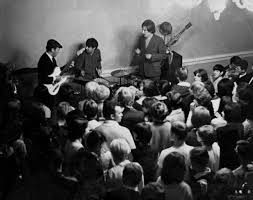 Rod Stewart with the Hoochie Coochie Men, 1965 Rod Stewart with the Hoochie Coochie Men, 1965 |
From there, Steam Packet was formed which included Reg Dwight, (later changing his name to Elton John.) Graham Bond was another original blues player, who never attempted to achieve commercial success. He worked with great musicians who later went on to be major players in the English beat scene. Dick Heckstalll-Smith played sax, and later joined John Mayall and Colleseum. Jack Bruce and Ginger Baker both later worked with Eric Clapton in Cream.
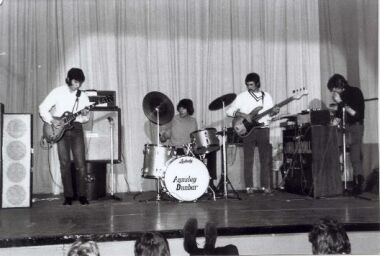 The Bluesbreakers, in 1966 with Peter Green, Aynsley Dunbar, John McVie, and John Mayell
The Bluesbreakers, in 1966 with Peter Green, Aynsley Dunbar, John McVie, and John MayellJohn Mayall and the Buesbreakers contributed two vital things to the British music scene in the 60’s. Good blues music, unconcerned with commercial ambitions, and a breeding ground for great talented young musicians.
Above, John (right) is with Peter Green, guitar, later to form Fleetwood Mac with John McVie, seen here on bass, and Aynsley Dunbar, one of the UK.'s best known drummers. ever), playing in the early 1967
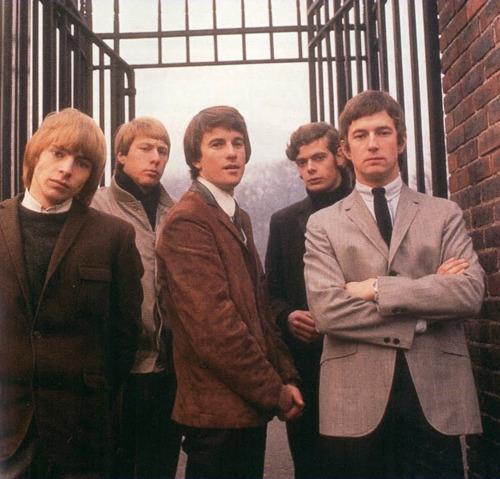 Early publicity shot of England's most blues-wailing Yardbirds. Left to Right: Keith Relf, Chris Dreja, Jim McCarty, Paul Samwell-Smith and Eric "Slowhand" Clapton.
Early publicity shot of England's most blues-wailing Yardbirds. Left to Right: Keith Relf, Chris Dreja, Jim McCarty, Paul Samwell-Smith and Eric "Slowhand" Clapton.Other great bands from the British blues inversion who achieved success both in the U.K. and the U.S.A were TheYardbirds, (who produced three of the greatest guitarists ever) and succeeding to win audiences on both sides of the Atlantic.
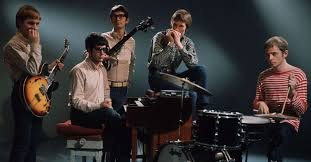
Manfred Mann, who featured Paul Jones, one of the best and most original blues singers to emerge from the British Blues invasion
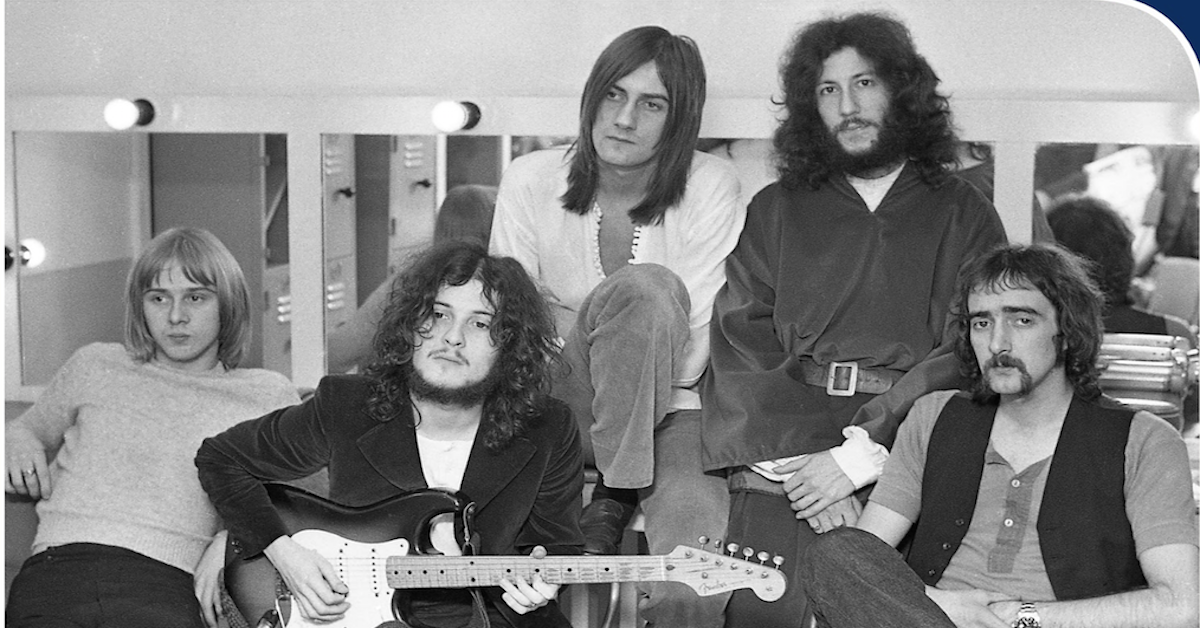
And, the band most people associate with Stevie Nix, the original Fleetwood Mac!
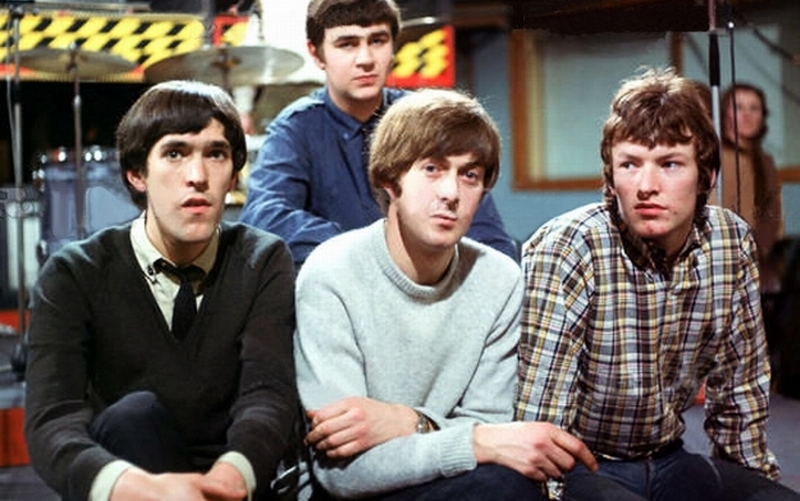 Ready for another TV appearance, (L to R) Muff Winwood, Pete York, Spencer Davis, and Steve Winwood.
Ready for another TV appearance, (L to R) Muff Winwood, Pete York, Spencer Davis, and Steve Winwood.Then in early 1965 came yet another brilliant blues band with a great lead singer. The Spencer Davis Group featuring the outstanding vocals of Stevie Winwood appeared with "Keep On Running". The band launched the career of Steve Winwood, one of the finest vocalists to emerge from the U.K.
Enjoy this site? Share with friends!
True British Blues!
The original Fleetwood Mac.
Vocals by Peter Green , Danny Kirwan (short blond hair) Jeremy Spencer, (curly hair) on guitars, John McVie on bass and Mick Fleetwood drums. McVie and Fleetwood were the only two originals in the later famous band.
Books on British Blues

The British Blues Network examines the role of British narratives of masculinity and power in the postwar era of decolonization and national decline that contributed to the creation of this network, and how its members used the tropes, vocabulary, and mythology of African-American blues traditions to forge their own musical identities.
A Couple of Great British Blues Albums
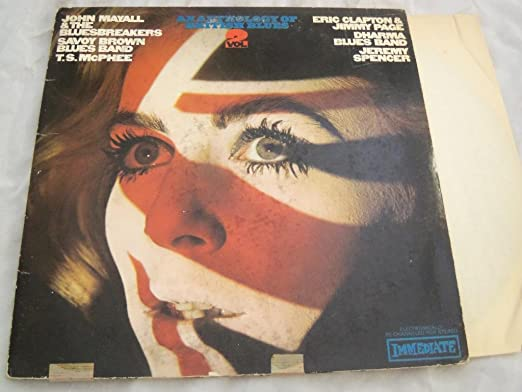
Anthology of British Blues, Vol 2
An excellent introduction the the British Blues Scene. Twelve tracks in all, featuring Eric Clapton with John Mayall, and also duetting with Jimmy Page. Jeremy Spencer is here and Savoy Brown Blues band.
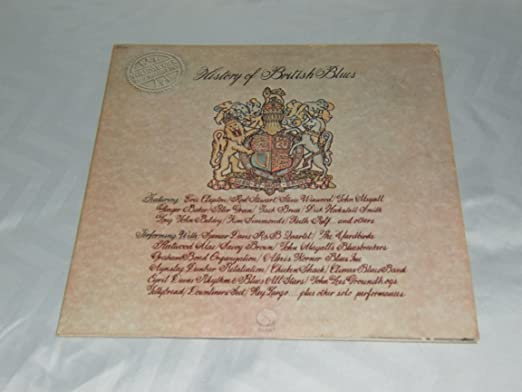
A History Of British Blues
Here is another great British Blues album. This one again has 12 tracks, nd has a great Rory Gallagher track come back Baby. There is also Cyril Davis, Alexis Korner, (with Long John Baldry and Dick Heckstall- Smith), Yardbirds with Eric Clapton, and others.
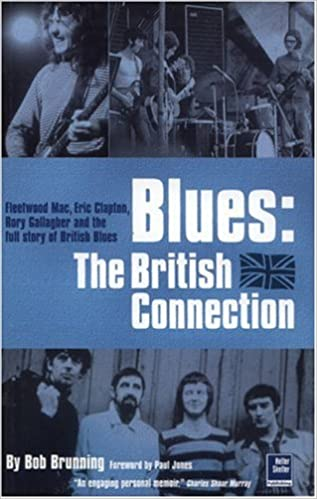
A book written by Bob Brunning, who played bass in the original Peter Green Fleetwood Mac until John McVie joined the band. One of my favorite reads, it covers early blues pioneers Alexis Korner, Cyril Davis, Clapton, Mayall Chicken Shack and a host of others. A great read.
Buy Blues, The British Connection
John Mayall, Eric Clapton. "Stormy Monday"
John Mayall "Walking On Sunset"
Jeff Beck and Rod Stewart, re-Unite for "People Get Ready"
Jeff insisted Rod only wore denim for this clip, no flash outfits!
